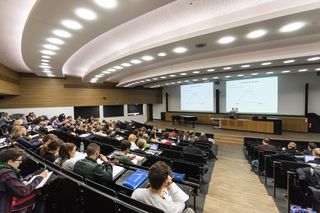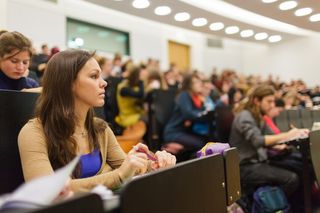In order to study in our faculty, you will have to fulfill certain requirements and comply with deadlines. On this page, we would like to give you an overview about the processes for the individual study programs.
- Applicant with German university entrance certificate (Abitur): via AlmaWeb (startinging at the beginning of May)
- Application with foreign university entrance certificate (Abitur): via uni-assist (starting mid April)
Please inform yourself regarding the application deadlines on this university webpage.
Applying for a master's study program
In order to apply for a master’s study program, you will need to go through an extensive selection process. Each study program’s process within the faculty will be explained further.
The application takes place completely online. You will need to complete a PDF portfolio with the necessary paperwork, which you will then upload to the application portal. Tips and information will be available to you during the application process.
Applying for multiple master’s programs is usually possible. However, only one study program can be started.
In order to enter a study program in a higher semester, you will have to already have academic credits in a similar master’s program. These credits will need to be inspected and approved by the respective study program’s exam board BEFORE APPLYING.
- Applicant with German university entrance certificate (Abitur) and a German B.A. degree: via ALMAWEB (May 2nd - May 31st, every year)
- Applicant with German university entrance certificate (Abitur) and foreign B.A. degree: via UNI-ASSIST (April 15th - May 31st, every year)
- Applicant with foreign university entrance certificate (Abitur) and German B.A. degree: via ALMAWEB (May 2nd - May 31st, every year)
- Applicant with foreign university entrance certificate (Abitur) and foreign B.A. degree: via UNI-ASSIST (April 15th - May 31st, every year)
ATTENTION:
- For the program M.A. Global Studies, you will usually have to apply via ALMAWEB, regardless if you have completed a degree in German or abroad.
- For the M.A. European Studies there is an additional application portal where you have to apply.
- The program M.A. Cultural Studies can be enrolled in during the summer and winter semesters. The application deadline for applicants via AlmaWeb starts at the beginning of December and ends on January 15th of every year. Applicants via uni-assist can apply between the beginning of November and December 31st.
Selection process for the master’s programs
The selection process for our master’s programs is very extensive. Find out here which requirements you will have to meet in order to be a part of the process and how the selection processes work.
The application takes place completely online. You will need to complete a PDF portfolio with the necessary paperwork, which you will then upload to the application portal. Tips and information will be available to you during the application process.
SUBJECT-SPECIFIC ENTRANCE REQUIREMENTS
- University degree that is subject-specific and qualifiable for a profession within the field of communication and media studies with at least 70 credit points in the core field of communication and media studies
- At least six months practical experience (cumulative and with a full-time equivalent time value) in the field of communication management through occupation, traineeship, internships, student employee position, etc.
- English skills at the B2 level of the Common European Framework of reference for Languages
Documents to be submitted
- Bachelor’s certificate (if already available)
- Transcript of Records with documented modules, lectures and current grade point average
- Proof of language skills English B2 (i.e. through school certificate or TOEFL test)
- Proof of at least six months practical experience in the field of communication management
- Three-page depiction (abstract or exposé) of the bachelor’s thesis
- Two-page motivational letter
- Curriculum vitae (CV)
Selection process
Step 1:
Inspection of the subject-specific entrance requirements according to the submitted documents.
Step 2:
In this step, the selection committee will award points (0 - 100) for five different criteria, which will go towards the overall score in different percentages. Then, the final ranking will be calculated.
- Bachelor final grade or current grade point average (15% of the overall score)
- Depiction of the bachelor’s thesis (20% of the overall score)
- Motivational letter (10% of the overall score)
- Adaptability of the modules taken during the bachelor’s degree (15% of the overall score)
Applicants who have at least 50 points in each of the four above criteria will be invited to come to Leipzig for an in-person selection interview with the selection committee.
- Selection interview (40% of the overall score)
Since the winter semester 2023/24 it is no longer possible to apply for the program!
Subject-specific entrance requirements
- First university degree which is qualifiable for a profession in the subject of political science or in a social-scientific or philological subject with at least 60 credit points in political science or 60 credits points relating to the social sciences with contextual relations to the master’s program, or at least proof that such a degree can be obtained by the beginning of the master’s program
- English language skills at the B2 level of the Common European Framework of Reference for Languages
- For applicants with a native language other than German: German language skills at the C1 level of the Common European Framework of Reference for Languages
Documents to be submitted
- Bachelor’s certificate (if already available)
- Transcript of Records with documented modules, lectures and current grade point average
- Proof of language skills English B2 (i.e. through school certificate or TOEFL test)
- Exposé (max. four pages) on a self-chosen topic with contextual relation to this study program in German or English. The exposé should name a problem in the political or economic field in eastern Central Europe, explain its connection to European integration and outline a solution strategy that is based in academic research.
- A statement regarding which study program the applicant is applying for: M.A. at the University of Leipzig or a double M.A. degree at the University of Leipzig and the Andrássy University in Budapest; the simultaneous application for both study degree programs is allowed, but the preferred program should be given.
- Curriculum vitae (CV)
Selection process
Step 1:
Inspection of the subject-specific entrance requirements according to the submitted documents.
Step 2:
In this step, the selection committee will award points in different categories, which will go towards the overall score in different percentages. Then, the final ranking will be calculated. The ten best applicants may be invited to a selection interview.
- Bachelor’s grade or current grade point average at the time of the application (60% of the overall score)
- Exposé (30% of the overall score)
- Selection interview (10% of the overall score)
Subject-specific entrance requirements
- Certificate belonging to a six-semester history or cultural studies bachelor’s program, a six-semester social-scientific bachelor’s program, or a certificate that has been declared equal according to legal regulation or the responsible government agency. Admission is also possible with the completion of a life sciences or natural sciences degree in related disciplines such as technological transformation, climate change, global health.
- English language skills at the B2 level of the Common European Framework of Reference for Languages
Documents to be submitted
- Bachelor’s certificate (if already available)
- Transcript of Records with documented modules, lectures and current grade point average
- Proof of language skills English B2 (i.e. through school certificate or TOEFL test)
- Proof of vocational training relating to study program, voluntary internships, or other activities relating to the intended study program.
- Motivational letter
- Curriculum vitae (CV)
Selection process
Step 1:
Inspection of the subject-specific entrance requirements according to the submitted documents.
Step 2:
In this step, the selection committee will award points (0 - 100) for four different criteria, which will go towards the overall score in different percentages. Then, the final ranking will be calculated.
- Bachelor’s grade or current grade point average at the time of the application (40% of the overall score)
- Motivation for studying (15% of the overall score)
- Prior knowledge and practical experience (15% of overall score)
Applicants who have at least 50 points in two of the three above criteria will be invited to come to Leipzig for an in-person selection interview with the selection committee.
- Selection interview (30% of the overall score)
Since the winter semester 2022/23 it is no longer possible to apply for the program!
Subject-specific entrance requirements
- University degree that is qualifiable for a profession: Bachelor’s program Communication and Media Studies at the University of Leipzig or a similar, subject-specific, and relevant study program of communication studies, media studies, journalism studies with at least 180 credits points
- English language skills verifiable through a TOEFL test with at least 100 points (IBT)
Documents to be submitted
- Bachelor’s certificate (if already available)
- Transcript of Records with documented modules, lectures and current grade point average
- Valid TOEFL test with at least 100 points (IBT)
- Proof of internships, prior knowledge or other activities related to the study program
- Three-page exposé about a possible academic research paper revolving around a core theme of the study program
- Curriculum vitae (CV)
Selection process
Step 1:
Inspection of the subject-specific entrance requirements according to the submitted documents.
Step 2:
In this step, the selection committee will award points (0 - 100) for four different criteria, which will go towards the overall score in different percentages. Then, the final ranking will be calculated.
- Bachelor’s grade or current grade point average at the time of the application (25% of the overall score)
- Exposé (25% of the overall grade)
- Prior knowledge and practical experience (25% of the overall score)
Applicants who have at least 50 points in all three of the above criteria will be invited to come to Leipzig for an in-person selection interview with the selection committee.
- Selection interview (25% of the overall score)
Subject-specific entrance requirements
- Certificate belonging to a six-semester history or cultural studies bachelor’s program, a six-semester social-scientific or economics bachelor’s program, or a certificate that has been declared equal according to legal regulation or the responsible government agency with at least 15% of the lectures taken relating to the subject of Global Studies
- English language skills at the level of B2 of the Common European Framework of Reference for Languages or UNIcert level II of the AKS, which is to be proved by one of the internationally recognized tests; exempt are native speakers and students who have received a degree at an English-speaking university
- Language skills in a second modern foreign language at the A2 level of the Common European Framework of Reference for Languages, to be proven through certificates
Documents to be submitted
- Bachelor’s certificate (if already available)
- Transcript of Records with documented modules, lectures and current grade point average
- Proof of language skills English B2
- Proof of language of another modern foreign language A2
- Proof of study program-related vocational training, voluntary internships, or other activities related to the intended study program
- Detailed motivational letter
- Academic recommendation letter
- Curriculum vitae (CV)
Selection process
Step 1:
Inspection of the subject-specific entrance requirements according to the submitted documents.
Step 2:
In this step, the selection committee will award points for four different criteria, which will go towards the overall score in different percentages. Then, the final ranking will be calculated.
- Academic excellence (50% of the overall score)
For the assessment of academic excellence, the final grade (or current grade point average) will be set in relation to the value of the (foreign) university qualification ANABIN. - Adaptability of the bachelor’s degree for the master’s program. The awarding of points is based upon the percentage of the lectures being related to globalization research (20% of the overall score)
- Motivation for studying (15% of the overall score)
- Adaptability of the verified practical/study program-accompanying activities in accordance with the educational objectives of the master’s program (15% of the overall score)
Subject-specific entrance requirements
- First university degree which is qualifiable for a profession or a degree belonging to a state or state-approved vocational academy
- Practical journalism prior experience has to be proven, which allows one to work extensively and independently in journalism. Further, knowledge of journalistic procurement and processing of information as well as the journalistic forms of representation has to be present. This knowledge can be obtained from a university program encompassing 30 credit points, from a respective journalistic apprenticeship or advanced training, or through an internship in an editorial team of a media company for the length of at least six months. In the course of this, journalistic content has to have been produced, or the creation of which has to have been participated in. These skills are to be proven through a certificate or a similar confirmation.
Documents to be submitted
- Bachelor’s certificate (in case already available)
- Transcript of Records with modules and classes taken and current grade point average
- Proof of journalistic internships (i.e. internship certificate or Transcript of Records)
- Two-page expsé about a topic in journalism research
- Two-page motivational letter
- Curriculum vitae (CV)
Selection process
Step 1:
Inspection of the subject-specific entrance requirements according to the submitted documents.
Step 2:
In this step, the selection committee will award points (0 - 100) in five different categories, which will go towards the overall score in different percentages. Then, the final ranking will be calculated.
- Bachelor’s grade or current grade point average at the time of the application (25% of the overall score)
- Exposé (10% of the overall score)
- Motivational letter (10% of the overall score)
- Adaptability of the journalistic prior knowledge (25% of the overall score)
Applicants who have at least 50 points in four categories (weighted) will be invited to come to Leipzig for an in-person selection interview with the selection committee. If several applicants meet this requirement, the number of those invited is a maximum of twice the number of study places.
- Selection interview (30% of the overall score)
Subject-specific entry requirements
- First university degree which is qualifiable for a profession or a degree belonging to a state or state-approved vocational academy in communication and media studies or a similar, subject-specific, and relevant study program of communication studies, media studies, journalism studies, or another social-scientific and humanistic study program with media subject matter, usually with 100 credits points, with 70 of these credits being in the core subject
- Language skills in English at the level of B2 of the Common European Framework of Reference for Languages
- An internship that comprises of at least 300 continuous hours in one or more study program-related institutions before being accepted into the study program
- Possible internship fields: media, opinion, or social research, media management, publishing, public relations, journalism, multimedia/online communication, media education, institutions with practical media training as well as librarianship, museums, and archive studies
- The internship is to be proven by submitting an internship certificate or proof that an internship can be completed before the master’s program will be started. Alternatively, to an internship, study program-related experience can be proven through other vocational activities in a field listed above, i.e. in the context of vocational training, stable or freelance work, or traineeship, etc.
Documents to be submitted
- Bachelor’s certificate (in case already available)
- Transcript of Records with modules and classes taken and current grade point average
- Proof of language skills English B2 (i.e. through school certificate or TOEFL test)
- Proof of at least 300 hours of practical experience in one or more media institutions
- Three-page depiction (Abstract or Exposé) of the bachelor’s thesis
- Curriculum vitae (CV)
Selection process
Step 1:
Inspection of the subject-specific entrance requirements according to the submitted documents.
Step 2:
In this step, the selection committee will award points (0 - 100) in three different categories, which will go towards the overall score in different percentages. Then, the final ranking will be calculated.
- Bachelor final grade or current grade point average (40% of the overall score)
- Depiction of the thesis (35% of the overall score)
- Prior experience, practical experience and adaptability of the modules taken in the bachelor’s program (25% of the overall grade)
Subject-specific entry requirements
- Proof of a degree in a cultural studies, social-scientific, philosophical, or historical bachelor’s program, or an equally-recognized study program at a different university with at least 60 credit points in the listed subjects. The exam commission at the Institute for Cultural Studies will decide over the equivalence.
- Language skills in English at the level B2 of tthe Common European Framework of Reference for Languages
- For applicants with another native language other than German: language skills in German at the level C1 of the Common European Framework of Reference for Languages
Documents to be submitted
- Bachelor’s certificate (in case already available)
- Transcript of Records with modules and classes taken and current grade point average
- Proof of language skills Englisch B2 (i.e. through school certificate or TOEFL test)
- Three-page written statement which aligns your previous study program with the cultural studies master and specifies your individual study and research goals during the master’s program
- Curriculum vitae (CV)
Selection process
Step 1:
Inspection of the subject-specific entrance requirements according to the submitted documents.
Step 2:
In this step, the selection committee will award points (0 - 100) in two different categories, which will go towards the overall score in different percentages. Then, the final ranking will be calculated.
- Bachelor final grade or current grade point average at the time of the application (50% of the overall score)
- Substantial adaptability of the modules taken in the bachelor’s program compared to the four core themes taught at the Institute for Cultural Studies (50% of the overall score)
Important: The M.A. Philosophy has a different application process. Information and the application portal can be found here.
Subject-specific entry requirements
- Proof of a first university degree that is qualifiable for a profession with at least 60 credit points in Philosophy
- Language skills in English level B2 of the Common European Framework of Reference for Languages
- For applicants with a different native language other than German: German language skills at the level C1 of the Common European Framework of Reference for Languages
Documents to be submitted
- Bachelor’s certificate (in case already available)
- Transcript of Records with modules and classes taken and current grade point average
- Proof of language skills Englisch B2 (i.e. through school certificate or TOEFL test)
Selection process
Step 1:
Inspection of the subject-specific entrance requirements according to the submitted documents.
Step 2:
Enrollment at the University of Leipzig for the M.A. Philosophy.
Subject-specific entrance requirements
- First university degree that is qualifiable for a profession with at least 60 credits points in political science or a different, equivalent social-scientific university degree. The exam commission of the Institute for Political Science will decide about the equivalence.
- English language skills at the level B2 of the Common European Framework of Reference for Languages
- For applicants with a different native language than German: German language skills at the level C1 of the Common European Framework of Reference for Languages
Documents to be submitted
- Bachelor’s certificate (in case already available)
- Transcript of Records with modules and classes taken and current grade point average
- Proof of language skills English B2 (i.e. through school certificate or TOEFL test)
- An exposé (max. four pages) about a potential research project in German or English: Form a question about a political scientific, relevant topic of your choice. Discuss the pertinent current state of research as well as at least one (for a potential analysis) useful technical method
- Curriculum vitae (CV)
Advices for creating an exposé
Selection process
Step 1:
Inspection of the subject-specific entrance requirements according to the submitted documents.
Step 2:
In this step, the selection committee will award points (0 - 100) in two different categories, which will go towards the overall score in different percentages. Then, the final ranking will be calculated.
- Bachelor final grade or current grade point average at the time of the application (60% of the overall score)
- Exposé (40% of the overall score)
Subject-specific entrance requirements
- Completion of a bachelor's degree with at least 30 credits in the field of sociology or a comparable social science bachelor's degree program or at least 30 credits in the area of methods of empirical social research, of which at least 15 credits in the area of quantitative social research (in cases of doubt, the examination board decides)
- Proof of English language skills at the level B2 of the Common European Framework of Reference for Languages
Documents to be submitted
- Bachelor’s certificate (in case already available)
- Transcript of Records with modules and classes taken and current grade point average
- Proof of language skills English B2 (i.e. through school certificate or TOEFL test)
- Curriculum vitae (CV)
- One-paged exposé of the bachelor thesis
Selection process
Step 1:
Inspection of the subject-specific entrance requirements according to the submitted documents.
Step 2:
In this stage, the selection committee awards points from 0 - 3 in three different categories, which are included in the process grade in equal proportions and then result in the final ranking of all applicants.
- The content of the modules taken/the previous course content fits the focus of the M.A. Sociology,
- The content of the final thesis fits one of the main focuses of the M.A. Sociology,
- Average grade of achievements completed so far.
Frequently asked questions
Here you will find answers to frequently asked questions regarding the master’s application.
If you still have questions, you can contact the faculty’s helpdesk.
The application process for the Masters in Philosophy and Sociology differs from the processes for the other Masters programs.
We have compiled all information on this separately for you.
- Applicant with German university entrance certificate (Abitur) and a German B.A. degree: via ALMAWEB (May 2nd - May 31st, every year)
- Applicant with German university entrance certificate (Abitur) and foreign B.A. degree: via UNI-ASSIST (April 15th - May 31st, every year)
- Applicant with foreign university entrance certificate (Abitur) and German B.A. degree: via ALMAWEB (May 2nd - May 31st, every year)
- Applicant with foreign university entrance certificate (Abitur) and foreign B.A. degree: via UNI-ASSIST (April 15th - May 31st, every year)
For the program M.A. Global Studies, you will usually have to apply via ALMAWEB, regardless if you have completed a degree in German or abroad.
The program M.A. Cultural Studies can be enrolled in during the summer and winter semesters. The application deadline for applicants via AlmaWeb starts at the beginning of December and ends on January 15th of every year. Applicants via uni-assist can apply between the beginning of November and December 31st.
Yes, an application without a bachelor’s certificate is possible and even usual. It’s important that you include an exact documentation of your studies up to this point (=Transcript of Records), which includes the modules you have taken and passed with the credit points and grades. This has to do more with your individual course of study, not about the general description of your study program. The transcript should show that you will be able to graduate from your B.A. program at the correct time. Some universities testify this in a special way, others don’t. We will assume that it is realistic for you to have no more credits left in your bachelor’s program at the beginning of the master’s program if you have 140 credit points in your Transcript of Records.
You will have to send in proof by the beginning of the master’s program into the student’s office that you have no more credits to earn.
The bachelor’s certificate itself can be turned in by the end of the first semester.
Contrary to the bachelor’s and teaching study programs, your school grade (numerus clausus) has no impact on your master’s application. There is also no quota for waiting semesters or career experience.
For master’s programs, there is an extensive selection process. This doesn’t just depend on the grade you got in your bachelor’s degree. An application’s success is more dependent on your score in the selection process and how you compare to the other applicants. For every study program, there is a limited number of spots. Based on experience, there are usually way more applicants than spots.
Turning in documents belatedly is usually not possible. After the deadline on May 31st, the selection committee starts its job and examines the documents. In this way, only the documents available can be examined. So, please be careful that the documents are complete. When proving practical experience, just mentioning it in your CV will not suffice. Only certificates and similar documents will be taken into consideration which detail the duration and content of the activity.
The acceptance letters (and also the rejection letters) will be sent out after the commission is done examining the applications. In study programs where selection interviews take place, the decisions will be sent out after this. Positive and negative decisions will be sent out at the same time. If you have not yet received a decision, the process is still underway. Because of this, please abstain from asking.
All decisions will be made available to you in your applicant account in AlmaWeb.
Please be aware that you only have 14 days time to accept your spot. Otherwise, the spot will expire.
Many master’s programs in our faculty have limited spots because we have many more applications than spots each year. The selection process has the job of ranking all applicants. Only the best will receive a spot.
If you receive a rejection due to capacity reasons, you will be given a rank. Depending on how many applicants before you don’t accept their spot, the more likely it is that you will be moved up in the ranking list.
If you should not get a spot despite the replacement process, you have the chance to apply again the following year. There is no cut-off for the number of applications. Please be aware, though, that the ranking always is in comparison to the other applicants. A good rank one year does not at all guarantee an identical rank the following year.
- Applicants with a German university entrance certificate (Abitur): via ALMAWEB (starting May 2nd, every year)
- Applicants with a foreign university entrance certificate (Abitur): via UNI-ASSIST (starting mid-April, every year)
Inform yourself about the application deadlines on the university’s website.










